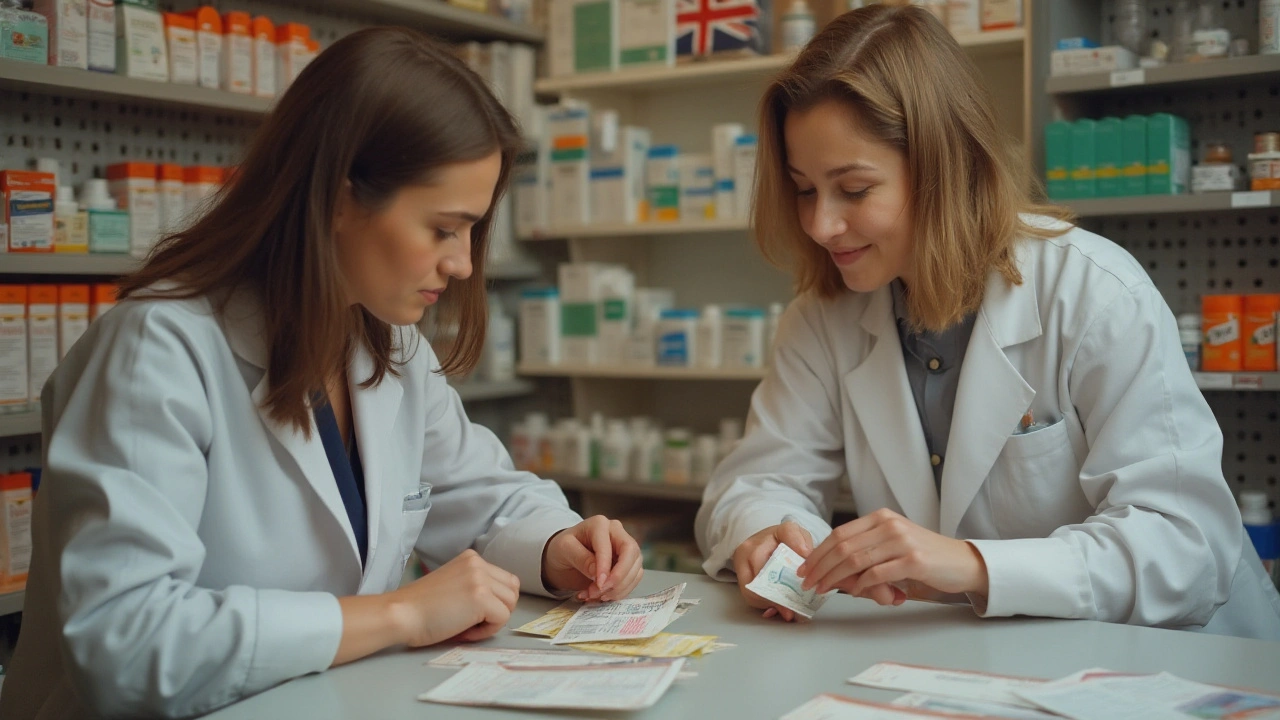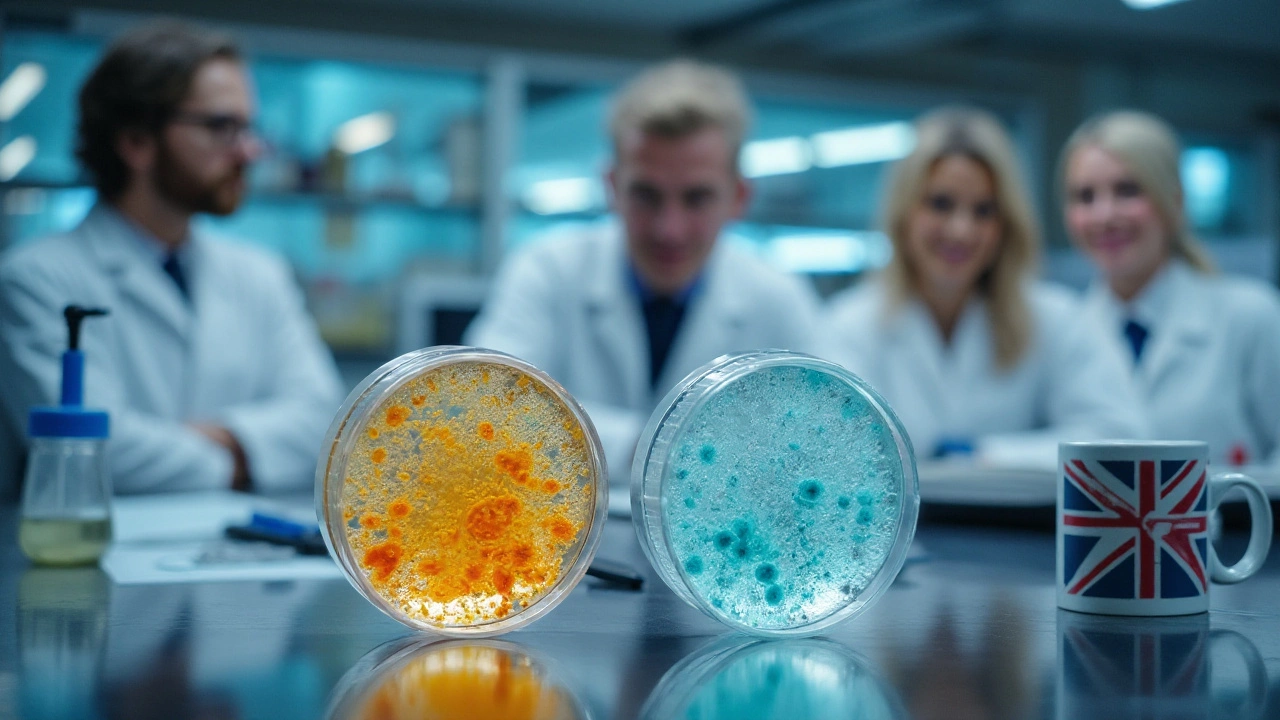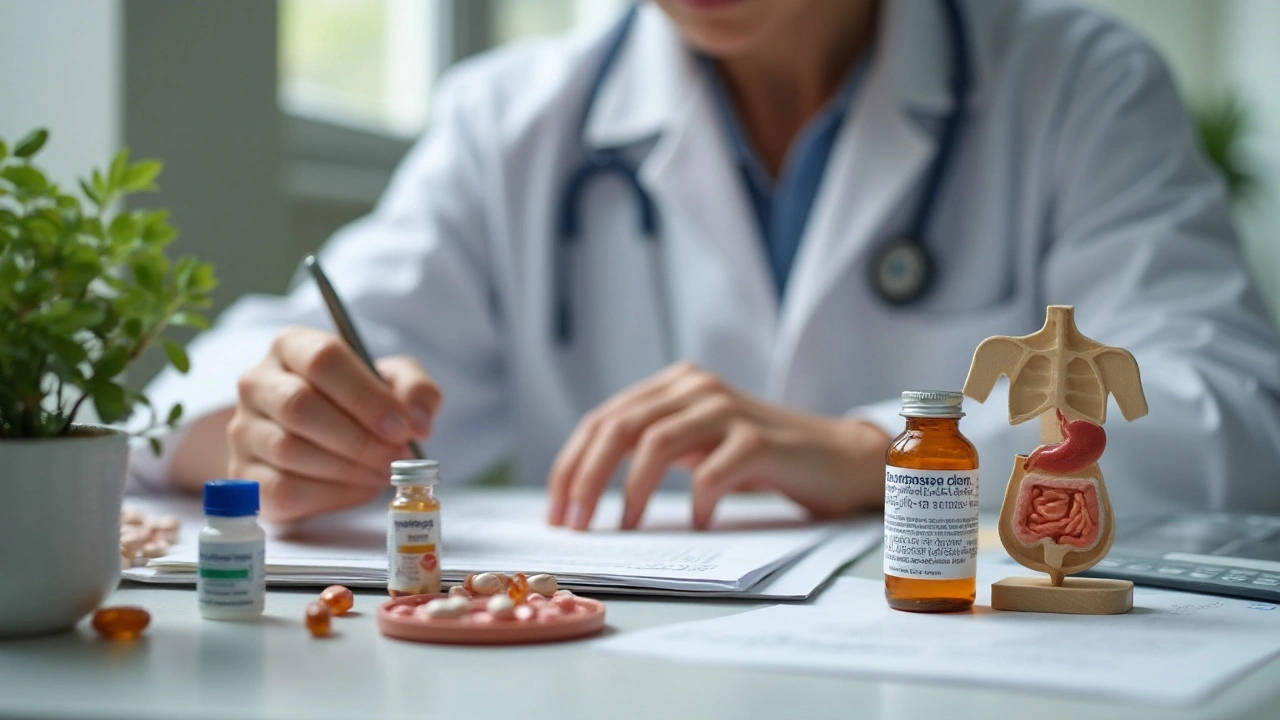Antibiotics have become a cornerstone in modern medicine, especially for treating infections. They are particularly effective when dealing with bacterial infections in both the intestines and the vaginal area. However, it's important to use them properly to avoid unwanted side effects and complications.
In this article, we will delve into how antibiotics work specifically for intestinal and vaginal infections. We’ll cover some of the most common infections, the risks associated with misuse, and ways to ensure antibiotics are used safely and effectively.
- Understanding Antibiotics
- Common Intestinal Infections and Treatments
- Vaginal Infections and Their Remedies
- Risks of Misusing Antibiotics
- Helpful Tips for Proper Use
Understanding Antibiotics
Antibiotics are powerful medications used to fight bacterial infections. They work by either killing bacteria or preventing them from multiplying and spreading. The discovery of antibiotics has revolutionized healthcare, saving countless lives from infections that were once considered deadly. The first antibiotic, penicillin, was discovered by Alexander Fleming in 1928, and it marked the start of a new era in medicine.
There are different types of antibiotics, each targeting specific bacteria. For example, broad-spectrum antibiotics can act against a wide variety of bacteria, while narrow-spectrum antibiotics are effective against specific types. The choice of antibiotic depends on the nature of the infection and the bacteria causing it. Doctors often conduct tests, such as cultures, to identify the bacteria and choose the most effective antibiotic.
Antibiotics work in two main ways: bactericidal and bacteriostatic. Bactericidal antibiotics kill bacteria directly, while bacteriostatic antibiotics stop bacteria from growing and multiplying. Both methods are effective, but their use depends on the infection's severity and location. For instance, a bactericidal antibiotic may be preferred for severe infections, like sepsis, where quickly killing bacteria is crucial.
One of the essential things to remember is that antibiotics are only effective against bacterial infections. They do not work for viral infections, such as the common cold or flu. Misusing antibiotics for viral infections can lead to antibiotic resistance, where bacteria evolve and become resistant to the drugs designed to kill them. This phenomenon is a growing concern worldwide, as resistant bacteria can lead to more severe illnesses and complications.
According to the World Health Organization (WHO), antibiotic resistance is one of the biggest threats to global health. They report that "a growing number of infections, such as pneumonia, tuberculosis, gonorrhoea, and salmonellosis, are becoming harder to treat as the antibiotics used to treat them become less effective." This highlights the importance of using antibiotics responsibly and only when prescribed by a healthcare professional.
Another critical aspect is the proper dosage and duration of antibiotic treatment. It's crucial to complete the prescribed course even if you start feeling better. Stopping treatment early can allow some bacteria to survive and develop resistance. Always follow your doctor's instructions and never share antibiotics with others or use leftover prescriptions. Doing so can contribute to resistance and may not effectively treat the infection.
In recent years, there has been a push towards developing new antibiotics and alternative treatments due to the rising issue of antibiotic resistance. Research is ongoing to find new ways to combat resistant bacteria, including the use of bacteriophages, which are viruses that infect and kill bacteria. Although still in experimental stages, these alternatives show promise in tackling antibiotic-resistant infections.
Understanding how antibiotics work and the importance of their appropriate use is crucial for maintaining their effectiveness. When used correctly, antibiotics can be life-saving drugs that treat infections efficiently and safely. Educating ourselves and others about the proper use of antibiotics helps ensure that they remain effective tools in our fight against bacterial infections.
Common Intestinal Infections and Treatments
Intestinal infections are caused by various pathogens, including bacteria, viruses, parasites, and fungi. For bacterial infections, antibiotics can be a highly effective treatment. One of the most well-known bacterial intestinal infections is caused by Clostridium difficile (C. diff). This infection often occurs after the use of broad-spectrum antibiotics, which disrupt the natural balance of bacteria in the gut.
Symptoms of C. diff include severe diarrhea, fever, and abdominal pain. Treatment often involves stopping the antibiotics that triggered the infection and starting a specific antibiotic that targets C. diff, such as vancomycin or fidaxomicin. In some severe cases, fecal transplants have been used to restore the normal gut flora.
Another common bacterial infection is caused by Salmonella. It's often contracted through contaminated food or water. Symptoms include diarrhea, fever, and cramps. While most people recover without antibiotics, they are sometimes necessary for severe cases or for people with compromised immune systems. Ciprofloxacin or azithromycin are commonly used antibiotics for treating Salmonella infections.
According to Dr. Jane Smith, an infectious disease specialist, "The best way to prevent bacterial intestinal infections is through proper hygiene and food safety practices. However, when infections do occur, antibiotics can be lifesaving."
Viral intestinal infections, such as rotavirus or norovirus, are another common issue. Antibiotics are ineffective against viruses, so treatment focuses on staying hydrated and managing symptoms. In some cases, antiviral medications may be prescribed, but this is rare.
Parasitic infections, like those caused by Giardia or Entamoeba histolytica, usually require a different approach. Metronidazole or tinidazole are often prescribed to kill the parasites. These medications are highly effective when used correctly, but it's crucial to follow the prescribed course to prevent recurrence.
Bacterial, viral, and parasitic infections each require their own tailored treatments. Misusing antibiotics not only risks ineffective treatment but can also lead to antibiotic resistance, making future infections harder to treat. It's always best to consult with a healthcare provider for proper diagnosis and treatment.
When dealing with any infection, proper hygiene, and food safety measures can go a long way in prevention. Washing hands thoroughly, cooking meat to the right temperature, and avoiding unclean water sources are simple but effective steps you can take to safeguard your health.

Vaginal Infections and Their Remedies
Vaginal infections are a common issue faced by many women, characterized by symptoms like itching, burning, unusual discharge, and sometimes pain. These infections can be caused by bacteria, yeast or even parasites, each requiring a specific treatment approach. One of the most frequent bacterial infections in this category is bacterial vaginosis, caused by an imbalance of naturally occurring bacterial flora. Another common infection is caused by Candida, leading to yeast infections.
Treating these infections usually involves the use of antibiotics for bacterial causes or antifungal medications for yeast infections. For example, Metronidazole and Clindamycin are often prescribed for bacterial vaginosis. Yeast infections can often be treated with over-the-counter antifungal creams or oral medications like Fluconazole. However, it's important to get a proper diagnosis from a healthcare professional to ensure the right treatment is used.
A study by the Centers for Disease Control and Prevention (CDC) reported that bacterial vaginosis affects nearly 30% of women in the United States. This highlights the importance of recognizing symptoms early and seeking appropriate treatment. For yeast infections, it's essential to maintain good hygiene and avoid irritants like scented soaps or douches, which can disrupt the natural balance of bacteria and yeast in the vagina.
"Proper diagnosis and treatment of vaginal infections are crucial for avoiding complications and ensuring overall reproductive health." — Dr. Emily Landers, Gynecologist
It's worthwhile to adopt some preventative measures to reduce the risk of developing these infections. Wearing cotton underwear, avoiding tight-fitting clothing, and maintaining a healthy diet can all contribute to a healthier vaginal environment. Additionally, probiotics are an emerging area of interest as they may help maintain or restore the natural bacterial balance in the vagina. Some studies suggest that probiotics, particularly those containing Lactobacillus, can be beneficial in preventing recurrent bacterial vaginosis.
Another essential aspect is understanding the role of antibiotics in treating vaginal infections. While they are effective, their misuse can lead to antibiotic resistance, making it harder to treat infections in the future. Therefore, it's crucial to take the full course as prescribed, even if symptoms improve before the medication is finished. Not doing so can result in a partially treated infection, which can become more challenging to eradicate.
In summary, vaginal infections are common but treatable with the right approach and medication. Awareness, timely diagnosis, and treatment, alongside preventative measures, can significantly improve comfort and reduce the risk of recurrent infections. Always consult with a healthcare professional for an accurate diagnosis and tailored treatment plan.
Risks of Misusing Antibiotics
Misusing antibiotics is a serious issue that can have multiple negative impacts on your body and public health. One of the most alarming risks is the development of antibiotic resistance. This happens when bacteria evolve and become impervious to the drugs that once killed them. Once bacteria become resistant, it becomes difficult, sometimes impossible, to treat the infections they cause. This can lead to longer illnesses, more hospital stays, and a higher chance of complications.
Another risk is disrupting your gut flora. Your gut is home to trillions of bacteria that play crucial roles in digestion, metabolism, and immune function. Taking antibiotics unnecessarily or for the wrong infection can kill not just the harmful bacteria but also the beneficial ones. This can lead to digestive issues, weakened immunity, and even conditions like Clostridioides difficile infection, which causes severe diarrhea and can be life-threatening.
Overuse and misuse of antibiotics can lead to allergic reactions. Some people may develop rashes, itching, or even severe reactions like anaphylaxis. It's crucial to take antibiotics only when prescribed and to complete the full course, even if you start feeling better. Stopping antibiotics too early can lead to the resurgence of the infection, creating a vicious cycle that makes the infection even harder to treat.
Using antibiotics when they aren’t needed can also mask the real cause of an illness. For example, many people mistakenly take antibiotics for viral infections like the common cold or flu. Antibiotics have no effect on viruses, so you're not only failing to treat the actual cause but also exposing your body to unnecessary medication. This can complicate diagnosis and delay appropriate treatment.
Financial costs add another layer to the issue. Misusing antibiotics leads to increased healthcare costs due to more frequent doctor visits, longer illnesses, and more extensive treatments. According to the Centers for Disease Control and Prevention (CDC), antibiotic resistance adds an estimated $20 billion in direct healthcare costs in the United States alone.
"Antibiotic resistance is one of the biggest threats to global health, food security, and development today" - World Health Organization (WHO)
Finally, antibiotic misuse has ecological consequences. When antibiotics are consumed, a portion of them is excreted from the body and can enter natural ecosystems through sewage and agricultural run-off. This environmental exposure contributes to the global spread of antibiotic-resistant bacteria, affecting wildlife and natural habitats.

Helpful Tips for Proper Use
Using antibiotics responsibly is the key to treating both intestinal infections and vaginal infections effectively. Improper use can lead to antibiotic resistance, making it increasingly difficult to treat infections in the future. One primary guideline is to always complete the entire course of antibiotics, even if symptoms seem to improve before the medication is finished.
Firstly, it is essential to follow the dosage instructions carefully. Skipping doses or not taking the medicine at regular intervals can decrease its efficacy. A consistent level of the drug in your bloodstream is required for it to work effectively against bacteria. Antibiotics should always be taken with water unless directed otherwise by your healthcare provider. Some antibiotics may interact with food, beverages, or other medications, reducing their effectiveness.
Another important tip is never to use leftover antibiotics for a new infection without consulting a healthcare provider. Each infection requires a specific type of antibiotic and dosage, and using the wrong antibiotic can worsen the infection or contribute to drug resistance. Similarly, never share antibiotics with others. What works for one person’s infection may not be appropriate or safe for another.
Store antibiotics properly, according to the instructions on the label or information provided by your pharmacist. Some antibiotics require refrigeration, while others should be kept in a cool, dry place. Improper storage might make the medication less effective. If in doubt, consult your pharmacist for advice.
It’s also important to be aware of potential side effects. Common side effects of antibiotics can include nausea, diarrhea, and yeast infections. In some cases, antibiotics can cause allergic reactions. If you experience symptoms like rash, swelling, or difficulty breathing, seek medical help immediately. Reporting side effects to your healthcare provider can help in choosing a different antibiotic in the future.
Interaction with alcohol and other medications is another crucial consideration. Some antibiotics, like metronidazole and tinidazole, can cause severe reactions when taken with alcohol. Your healthcare provider or pharmacist can offer guidance specific to your prescribed antibiotic. Misunderstanding these instructions can lead to severe side effects.
“Adherence to the prescribed antibiotic regimen is crucial not only to successfully treat the current infection but also to prevent resistance development,” says Dr. Jane Doe, an infectious disease specialist.Finally, taking probiotics can be beneficial while on an antibiotic regimen. Antibiotics can disrupt the balance of good and bad bacteria in your gut, and probiotics help restore this balance. Incorporating yogurt, kefir, or other probiotic-rich foods into your diet can help mitigate some gastrointestinal side effects.
Keep a medication diary to track your dosage times, side effects, and interactions. This can be particularly helpful if you are taking more than one medication or have a complex dosing schedule. Documenting your experience helps you stick to the prescribed plan and can be a useful reference for future consultations with your healthcare provider.



